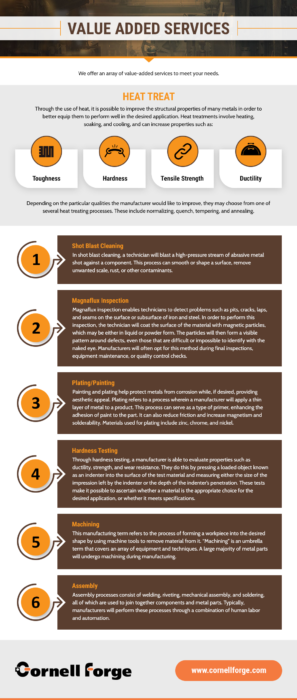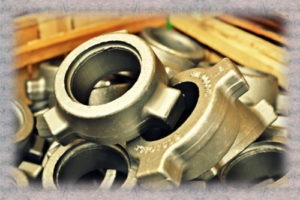At Cornell Forge, we are an ISO 9001:2015 certified company dedicated to providing outstanding parts tailored to each customer’s unique specifications. We provide an array of design, tooling, and forging capabilities, and offer many value-added services to ensure that we meet your needs no matter the complexity of your project.
Design & Tooling
We offer the following design and tooling capabilities.
Concurrent Engineering
Sometimes referred to as simultaneous engineering, concurrent engineering enables manufacturers to run every stage of the product design and production process at the same time. Compared to engineering methods where the design stages must run consecutively, concurrent engineering significantly reduces the time it takes to develop products and get them to market. Since engineers can catch design problems more quickly, this method increases productivity and efficiency, thus providing businesses with a competitive edge.
Optimal Forging Design
There are a number of factors to consider when planning an optimal forging design. At Cornell Forge, our designers account for the machining allowance, the draft, the parting line, and the presence of ribs, webs, bosses, and recesses to ensure high-quality forged products.
In-House Tooling
Opting for in-house tooling reduces lead times and costs while improving quality and communication. As we perform every step of the tooling process at our own facilities, our experts are highly familiar with our equipment and can easily adapt to the unique specifications of each new project. Rather than spending time waiting on outside contractors, we ensure that each part is produced in a timely and economical manner.
Metallurgical Consulting
As metallurgical consultants, with our staff metallurgist, we are able to assist in evaluating a material’s performance in harsh environments, resolving quality control difficulties, and analyzing product failures. Our skilled team will work with you to identify affordable materials that will provide optimal performance in your desired application, reducing the risk of problems and enabling hassle-free large production runs.
Types of Metal Forging

Impression Die Forging
While open die forging is ideal for large parts, impression die forging is preferable for smaller precision parts. The two processes are similar, with the most significant difference being that impression dies will fully enclose the base material during the forging process. This method is compatible with most engineering metals, including carbon steel and copper alloys.
Parts formed in the impression die process have tight tolerances, excellent surface finishes, and rarely require secondary machining operations. Industries requiring precision parts, including the automotive and mining industries, will frequently utilize this process.
Closed Die Hot Forging
Closed die hot forging involves two halves of a heated die moving toward each other, covering the workpiece in part or in whole. The dies contain a precut profile of the desired part, and the heated raw material, which is placed in the bottom die, is approximately the size or shape of the final forged part. As the top die clamps down on the bottom die, the impact forms the raw material into the required form. Once the material solidifies, it is extracted from the dies, and flash is removed if necessary.
This process can yield close tolerances and complex shapes. Closed die hot forging is suitable for parts ranging from a few ounces up to 60,000 lbs, and it is compatible with a wide range of materials, including copper, stainless steel, nickel, and many more.
Value-Added Services
We offer an array of value-added services to meet your needs.
Heat Treat
Through the use of heat, it is possible to improve the structural properties of many metals in order to better equip them to perform well in the desired application. Heat treatments involve heating, soaking, and cooling, and can increase properties such as:
- Toughness
- Hardness
- Tensile Strength
- Ductility
Depending on the particular qualities the manufacturer would like to improve, they may choose from one of several heat treating processes. These include normalizing, quench, tempering, and annealing.
Magnaflux Inspection
Magnaflux inspection enables technicians to detect problems such as pits, cracks, laps, and seams on the surface or subsurface of iron and steel. In order to perform this inspection, the technician will coat the surface of the material with magnetic particles, which may be either in liquid or powder form. The particles will then form a visible pattern around defects, even those that are difficult or impossible to identify with the naked eye. Manufacturers will often opt for this method during final inspections, equipment maintenance, or quality control checks.
Plating/Painting
Painting and plating help protect metals from corrosion while, if desired, providing aesthetic appeal. Plating refers to a process wherein a manufacturer will apply a thin layer of metal to a product. This process can serve as a type of primer, enhancing the adhesion of paint to the part. It can also reduce friction and increase magnetism and solderability. Materials used for plating include zinc, chrome, and nickel.
Hardness Testing
Through hardness testing, a manufacturer is able to evaluate properties such as ductility, strength, and wear resistance. They do this by pressing a loaded object known as an indenter into the surface of the test material and measuring either the size of the impression left by the indenter or the depth of the indenter’s penetration. These tests make it possible to ascertain whether a material is the appropriate choice for the desired application, or whether it meets specifications.
Machining
This manufacturing term refers to the process of forming a workpiece into the desired shape by using machine tools to remove material from it. “Machining” is an umbrella term that covers an array of equipment and techniques. A large majority of metal parts will undergo machining during manufacturing.
Shot Blast Cleaning
In shot blast cleaning, a technician will blast a high-pressure stream of abrasive metal shot against a component. This process can smooth or shape a surface, remove unwanted scale, rust, or other contaminants.
Assembly
Assembly processes consist of welding, riveting, mechanical assembly, and soldering, all of which are used to join together components and metal parts. Typically, manufacturers will perform these processes through a combination of human labor and automation.
Request Your Custom Forged Parts Today
For over 90 years, Cornell Forge has been providing high-quality, innovative forging solutions for a wide range of industries from agriculture and defense to oil and gas, aerospace, and more. Our industry experience combined with our commitment to customer satisfaction makes us the ideal partner for your custom forged parts. To learn more about our capabilities, or to work with us on your next project, contact us or request a quote today.
Capabilities
Materials forged :
- Carbon/alloy steel up to 100#’s
- Stainless steel up to 30#’s
Design & Tooling :
- Concurrent engineering
- Optimal forging design
- In-house tooling
- Metallurgical Consulting
Value-added services :
- Heat Treat
- Magnaflux Inspection
- Sawing
- Plating / Painting
- Hardness Testing
- Machining
- Shotblast Cleaning
- Assembly

Cornell is an ISO 9001:2015 certified company and maintains strict process controls to achieve our consistent quality. We have rigorous preventative maintenance schedules to ensure our equipment can consistently produce to customer specifications. Whatever the application, Cornell is prepared to meet customer quality requirements from basic tolerances to advanced, non-destructive testing techniques. Our rigorous quality processes ensure the internal integrity of the part or products. Our pride in providing outstanding parts every time ensures that you won’t be strapped with the “hidden costs” of poor quality.



